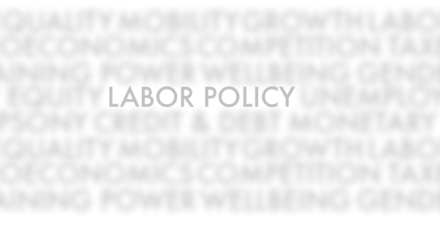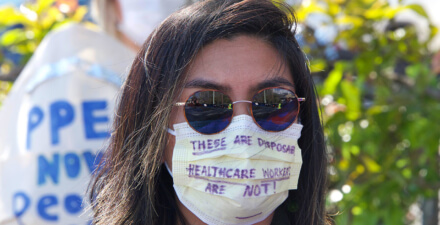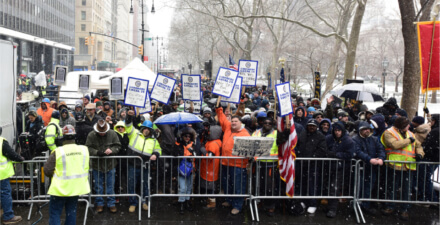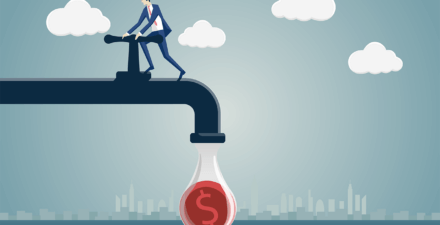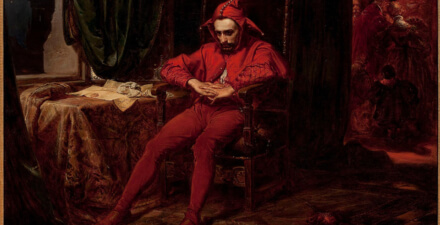Overview
Equitable Growth in Conversation is a recurring series where we talk with economists and other academics to help us better understand whether and how economic inequality affects economic growth and stability. In this installment, Equitable Growth Director of Family Economic Security Policy Alix Gould-Werth talks with Alexander Hertel-Fernandez, an associate professor of international and public affairs at Columbia University, where he studies American political economy, with a focus on the politics of business, labor, wealthy donors, and policy, and a 2017 Equitable Growth grantee.
His most recent book, “State Capture: How Conservative Activists, Big Businesses, and Wealthy Donors Reshaped the American States—and the Nation” (Oxford University Press, 2019), examines how networks of conservative activists, donors, and businesses built organizations to successfully reshape public policy across the states and why progressives failed in similar efforts. His previous book, “Politics at Work: How Companies Turn Their Workers into Lobbyists” (Oxford University Press, 2018), examines how employers are increasingly recruiting their workers into politics to change elections and policy. He also is an expert in the Unemployment Insurance system.
In a recent conversation between Gould-Werth and Hertel-Fernandez, they discuss:
- Weaknesses in the current U.S. Unemployment Insurance system
- Five ways policymakers can fix the unemployment benefits system:
- Setting minimum standards
- Improving automatic triggers to turn on and turn off unemployment benefits
- Adapting unemployment benefits for today’s workforce
- Financing a robust Unemployment Insurance system
- Giving workers ownership over the system
- How improved unemployment benefits would have helped workers in the Great Recession and current coronavirus recession
- How fiscal constriction undermines Unemployment Insurance
- What political science can bring to the unemployment benefits discussion
- Target populations in the unemployment benefits discussion
- Unemployment benefits and worker power
- The role of academics in designing and reforming the Unemployment Insurance system
- Why employers funding the Unemployment Insurance system is problematic
- The importance of academics understanding the lived experiences of unemployed workers
[Editor’s note: This conversation took place on August 18, 2020.]
Alix Gould-Werth: I’m here with Equitable Growth grantee Alex Hertel-Fernandez. Among his many areas of scholarly research, Alex is an expert on Unemployment Insurance, the main government program that provides income replacement to workers who lose their jobs through no fault of their own. Alex and I have been talking about Unemployment Insurance since our grad school days during the sluggish recovery from the Great Recession. I’m glad to have the opportunity to continue this important discussion today as part of Equitable Growth’s In Conversation series. So, to start off, Alex, I’m interested in what you see as the successes and failures of the Unemployment Insurance system in responding to the current novel coronavirus-induced economic crisis.
Weaknesses in the current U.S. Unemployment Insurance system
Alex Hertel-Fernandez: Well, thanks so much, Alix. I’m excited to talk about Unemployment Insurance. To answer your question, Unemployment Insurance provides important economic relief to tens of millions of Americans during the ongoing health crisis and economic crisis that we’re living through. By keeping households afloat during periods when a breadwinner would be out of work, Unemployment Insurance provides much-needed stimulus to the overall economy, ensuring that people can keep purchasing the items that they need, paying their rent, and so on.
But we’re also seeing the weaknesses of the UI system. And these are weaknesses that existed well before the conronavirus pandemic and the recession it caused. For one thing, at the start of the crisis, I think it became quite apparent to many Americans, especially recently jobless Americans, just how difficult it is to apply for benefits in the first place, due to a creaky infrastructure for delivering benefits. We’re also seeing how poorly equipped the system is to deal with economic downturns, requiring the U.S. Congress to step in and affirmatively pass new legislation that increases generosity and the availability of benefits to workers.
That’s not something that happens automatically. Congress is having to step in. We’re seeing the cost of that now, as Congress failed to pass an extension of Unemployment Insurance benefits when it expired at the end of July to continue supporting Americans throughout this economic downturn. So, I think in those ways, we’re seeing both the strengths of the system to support our economy but also a number of long-term problems that warrant attention from state and federal policymakers.
Five ways policymakers can fix the unemployment benefits system
Gould-Werth: So, given those problems, what policy fixes would you recommend to improve the response of the Unemployment Insurance system?
Hertel-Fernandez: I would say that there are five buckets of things that I would change about the system. That’s a lot, but I think that there are a number of pieces of the Unemployment Insurance system that have been flawed, really since the inception of the program, despite the important ways that it’s supported the economy over time.
To just step back a moment, the first thing to know about the Unemployment Insurance system is that it’s not really a system at all. It’s actually 50-plus different systems across the 50 different states, the District of Columbia, and other U.S. territories. The states and territories work in partnership with the federal government to provide unemployment benefits to workers who have lost a job through no fault of their own, and it’s the states, not the federal government, that, during normal times, set the rules for who is eligible to receive benefits, how much those benefits are, and how long they last, as well as how they’re financed.
Setting minimum standards
Hertel-Fernandez: As your research, Alix, and the research of a number of other scholars points out, giving states that discretion to set benefits has had some costs as states have decided to cut benefits, particularly in recent decades, and especially in the wake of the Great Recession. This leaves many jobless workers without the kind of unemployment protections that are needed to both keep them out of poverty and to support the overall economy.
So, the first thing I would do to change the Unemployment Insurance system is to set stronger minimum national standards for the states in terms of benefit eligibility and generosity and application, requiring that the states cover more people, that the states boost benefit generosity, and that the states make it easier for workers to access the program.
Improving automatic triggers to turn on and turn off unemployment benefits
Hertel-Fernandez: The second thing that I would change about the system is repairing the system of automatic triggers that exist. One of the things I mentioned earlier was how poorly equipped the Unemployment Insurance system was to deal with the surge in new unemployment that happened as a result of the coronavirus pandemic and COVID-19.
Congress had to step in and pass extensions and increases in generosity. Those are the sort of things that should kick in automatically without Congress having to act. Especially during the polarized moment that we’re in, we can’t count on Congress to move quickly. We need an Unemployment Insurance system that expands automatically during these periods of unemployment and then that has triggers that turn off when we don’t need those benefits. We need more automatic triggers built into the program.
Adapting unemployment benefits for today’s workforce
Hertel-Fernandez: The third thing I would change about the system is adapting it to the contemporary U.S. economy, in which many workers have relationships with different employers, not just one employer, and in which many workers may not actually be employees at all. They might be independent contractors, or they might work for one firm that provides services to another, such as a janitorial service that contracts with a building owner to clean offices, for instance. In these circumstances, it can be hard, if not impossible, for workers to access unemployment benefits.
As I mentioned, the Unemployment Insurance system was created during the New Deal, at a moment when traditional employment—that is, workers having a full-time, full-wage job with one employer—was much more common than it is now. So, we need to make sure that the system has adopted to the economy that we have, in which there are just far fewer workers who have those traditional relationships with employers.
Financing a robust Unemployment Insurance system
Hertel-Fernandez: The fourth thing I would change about the system is a subject near and dear to both of our collective hearts, and that’s how the program is financed. For many decades, the Unemployment Insurance system has suffered from eroding finances. States are collecting less and less money to fund the program, and that’s forcing states to make cutbacks in the generosity of benefits. As I document in my research, this isn’t a coincidence; it’s a way that opponents of the program have tried to cut it back. So, we need to change the financing system to adequately support benefits.
There are two things that I would recommend. One of them is making sure that the proportion of wages that are taxed for the Unemployment Insurance system keeps pace with inflation. That’s something that’s common in other social programs, such as Social Security, but perhaps surprisingly, it’s not present in the Unemployment Insurance system. The second thing I would change is eliminating the role of employers in financing the program, which gives employers incentives to oppose their workers claiming benefits, which I will explain more fully later in our conversation.
Giving workers ownership over the system
Hertel-Fernandez: And that leads to the last component of Unemployment Insurance reform that I think we should put on the table, which is thinking about ways to give workers and worker organizations such as labor unions more ownership over the system. That means perhaps building navigators—who are individuals or organizations that help people access government services and benefits—into the Unemployment Insurance system. The federal government could provide grants to labor unions or worker groups, for instance, to help workers apply for and receive benefits, and receive the training that they need when they’re on those benefits so they can find new work.
Another possibility is to switch to a system where worker organizations, such as unions, run their own Unemployment Insurance funds that complement state-run funds. That may sound like a rather dramatic reform, but it’s actually how many Unemployment Insurance systems in other countries, especially in northern Europe, are set up. Worker organizations that have the most contact with workers and employers are the ones in charge of running Unemployment Insurance funds, and that turns out to be a system that works quite well for workers, employers, and the government.
Gould-Werth: Well, thank you for that Alex. So many of those answers really made my heart sing. You have really thoughtful things to say about how we can make this program more responsive to the workers who need it. And when I was listening to your responses, one thing that I was struck by was that none of these answers are specific to an economic crisis that is brought on by a pandemic. They are overarching, long-term, structural changes to the system.
The importance of fiscal constriction in undermining the Unemployment Insurance system
Gould-Werth: This makes me think about one of the five reforms that you had discussed, which was making fixes to the eroded finances of the Unemployment Insurance system. I think sometimes it’s hard to understand how the backend of the financing system is affecting who is taking home benefits and how much. One area of your scholarship that has been a very useful frame for us at Equitable Growth is your work on fiscal constriction. I’m wondering if you can explain why you coined that term? What it means? And how it relates to how workers access benefits, and which workers access benefits and what level of benefits they receive?
Hertel-Fernandez: The idea of fiscal constriction refers to the phenomenon when opponents of a particular social program—that is, political forces who are opposed to the maintenance and expansion of a particular social program—realize that they can’t go after the program head on and so instead, they attack how that program is financed. The idea being that if you can attack the financing mechanisms of the social program, you can force policymakers to cut back on the benefits of that program.
As we look at various social programs across the landscape of the U.S. welfare state, Unemployment Insurance really stands out as being a powerful example of fiscal constriction. So, if you look over time, states have cut back on the financing capacity of the Unemployment Insurance system. Most of all, they are taxing a lower proportion of workers’ wages than they once did. And the key policy lever there is what’s known as the taxable wage base. So, like Social Security, Unemployment Insurance is based on a social insurance model where employers in the case of Unemployment Insurance, and workers and employers in the case of Social Security, pay taxes on a certain proportion of their wages, up to a certain limit.
With Social Security, in recent decades, that amount has been indexed to inflation so the amount of wages subject to Social Security taxes roughly keeps pace with changes in the overall economy. But that’s not the case for most states in the Unemployment Insurance systems, so that means over time, inflation erodes the taxable wage base in those states, which, in turn, means that states are taxing a lower and lower proportion of workers’ wages. Now, that all might sound very technical and archaic, but it matters because it produces fiscal strain on the Unemployment Insurance system and, as a result, states cut back on the generosity of their benefits.
I think that’s been so clear in the response to the Great Recession. States were already in dire fiscal straits going into the Great Recession in terms of their Unemployment Insurance systems, and the enormous claims that were made as a result of the Great Recession further worsened their financial position. Coming out of it, states then justified deep cutbacks to their benefits, pretty historically unprecedented cutbacks in the number of weeks that workers could be on Unemployment Insurance, by referring to the financial conditions of their Unemployment Insurance system.
Gould-Werth: That is such a useful insight, Alex, and I think it’s really helpful for thinking about the multiple angles from which we need to look at changes to the Unemployment Insurance system to ensure that it’s serving all workers in this country who are in need of income support when they lose their job through no fault of their own.
What political science can bring to the unemployment benefits discussion
Gould-Werth: As I’m hearing you talk about this concept, fiscal constriction, I’m thinking about how it really seems like a concept that sits squarely within your home discipline of political science. That makes me wonder, what does your perspective as a political scientist bring to bear on the analysis of Unemployment Insurance that is different from the perspective of economists, many of whom are often the dominant voices when it comes to Unemployment Insurance policy?
Hertel-Fernandez: The first thing to say is, I think a number of different disciplines have important roles to play in shedding light on public policies generally and programs such as Unemployment Insurance in particular. Economists have done really important research telling us about, for instance, how unemployment benefits affect the overall economy, provide stimulus during economic downturns, or how they kept individuals out of poverty by quantifying the anti-poverty effects of unemployment benefits. But I think political science has an important role to play shedding light on the design of public policies: why they are designed in the ways that they are, and then how the design of those programs affects their characteristics or their effects on the mass public and on interest groups.
In the case of unemployment benefits, I think political science concepts and work can tell us why the initial design of the Unemployment Insurance system left the program vulnerable to the sort of cutbacks that I’ve been describing with fiscal constriction. Why is it the case that states, for instance, have had this opportunity to cut back on benefits and to cut back on the taxing capacity and financial resources flowing into this program? I think that lens is important for understanding why we might see certain policies expand and attract more support over time, versus those that might erode over time or even disappear.
And I think a really helpful example of where political science can shed some important light on Unemployment Insurance comes from the comparisons to Social Security. Looking at the initial design of those two different programs can tell us why it is that, over time, Social Security has become more politically popular, has had interest groups such as AARP emerge to support the policy, and has had benefits and taxes expand over time, in contrast to Unemployment Insurance that has not seen those same political dynamics.
Only by reference to political science concepts and research can we understand the very different fates of these two different policies that were passed into law at the same time during the New Deal.
Target populations in the unemployment benefits discussion
Gould-Werth: That makes a lot of sense. Another lens that political science brings to our understanding of different programs that provide social support is the idea of the target population. It’s my understanding that a target population is the group of people that a program intends to serve, and that political science research shows that who the target population of a program is affects the political support for the program and also the design of the program itself. I’m interested in who you see as the target population of Unemployment Insurance.
Hertel-Fernandez: That’s a fantastic observation. There’s a lot to be said about how we construct, in a political sense, the different beneficiaries of various social programs and how that, in turn, affects the political sustainability of those programs. There’s a way in which Social Security’s targeting of senior citizens and how it refers to those senior citizens as valued members of society who have earned their benefits helps contribute to the longevity and popular support for Social Security because it’s seen as flowing to a “worthy population.”
In contrast, Unemployment Insurance has not tended to have a similar perception in the mass public. I think there’s a lot more concern, given the target population of supposedly “unworthy” workers or “lazy” workers receiving benefits, which is why you’ve seen states try and take so many measures to weed out “fraud and abuse” or potentially undeserving workers by subjecting applicants to really strict tests about the circumstances of their layoffs or their separation from their employers.
In part, this goes a long way toward explaining why Unemployment Insurance has been vulnerable to retrenchment over time. But I would also add that I don’t think this is a foregone conclusion. Other actors in society, especially interest groups, can play an important role in redefining this target population, in talking about jobless Americans as citizens who are worthy of support from the federal government.
One way in which the coronavirus crisis might change the politics of Unemployment Insurance is by exposing such a large proportion of the workforce to unemployment benefits. We’ve seen a massive explosion in the number of people who are on these benefits—some 30 million people who have applied for and received benefits in recent weeks, compared to about 2 million people in typical weeks before the crisis. That’s many more people who see themselves now as potential Unemployment Insurance beneficiaries as a result of their experience with the crisis. I wonder if that’s going to help build broader support for changes to the program over time.
Gould-Werth: I’m interested in diving a little deeper into how these target populations get constructed as deserving or undeserving. You started out by saying you’ve looked at the target population for Social Security as being deserving and then the target population for Unemployment Insurance as being less deserving. But, in some ways, the idea of a worker who loses a job through no fault of their own being an undeserving group seems counterintuitive to me. Could you shed any additional light on how we’ve gotten to a place where that group is thought of as being undeserving?
Hertel-Fernandez: It’s a great point, and in fact, if you go back to the moment of the creation of Unemployment Insurance and Social Security, it was actually the case that the wonks and the technocrats and the academics who were putting together this legislation spent far more time thinking about the design of Unemployment Insurance because in their mind, they saw this as a much more significant intervention and potential social program than Social Security, which received far less attention in the initial drafting process in the FDR administration. There’s this strange reversal of fortune between the two programs.
One especially important way that you have seen the negative perception of unemployment beneficiaries emerge is with the disappearance of labor unions, which, for many years, formed an important supporter of the Unemployment Insurance system, helping connect workers with benefits and conveying the message that if you lost your job through no fault of your own, you were entitled to receive these benefits. That was just part of what you expected as a worker in the U.S. economy. But as unions have declined in membership and in political strength and reach in society, opponents of the Unemployment Insurance system have had an easier time demonizing potential beneficiaries of the program than you would have had during the period of the immediate post-New Deal era, when unions were significantly stronger.
Unemployment Insurance and worker power
Gould-Werth: So, that’s an excellent segue into my next question. I wanted to talk about some of your other work. Much of your work has focused on corporate power, conservative activism, and worker organizing, as you were mentioning. So, how do you see your work on Unemployment Insurance intersecting with these other topics of study?
Hertel-Fernandez: I would say that the Unemployment Insurance system nicely brings together my work on corporate power and on labor organization because you’ve seen Unemployment Insurance being the site of contestation and fierce battles between corporate interests that have been trying to cut back the program for decades and, at least historically, unions being an important buttress of support for the program. Even though they are weaker today, unions continue to be an important player, especially at the state level, in Unemployment Insurance policy and at the individual-worker level in helping workers access the programs. So, I see Unemployment Insurance as the site where these interest group conflicts play out.
Gould-Werth: Great. So, in some ways, it’s a useful case study. Would you say that’s right?
Hertel-Fernandez: I think that’s right. And I think that there is more scope for Unemployment Insurance to support the labor movement than we see currently. As I mentioned with the idea of worker-led Unemployment Insurance funds, I think that that’s an exciting development that you can see states experiment with. A new federal-state reform of the Unemployment Insurance system could help buttress and revive the labor movement.
The role of academics in designing and reforming the Unemployment Insurance system
Gould-Werth: Excellent. I also wanted to ask you about another interest group, which is academics. At Equitable Growth, we aim to serve as a bridge connecting the academic community and policymakers. You have a strong track record when it comes to producing policy-engaged scholarship, and you also study the influence that various actors have on the policymaking process, as you just described. I’m interested in what you see as the role of academics in the policymaking process, both broadly and related to Unemployment Insurance specifically.
Hertel-Fernandez: Thinking about Unemployment Insurance, academics and policy experts have a really long legacy of shaping the program. As I mentioned, many of the initial ideas that the FDR administration pursued when it came to the design of Unemployment Insurance came from a group of economists, social scientists, and lawyers, especially those affiliated with the University of Wisconsin-Madison, who had been writing and talking about and debating a lot of these ideas in their academic research for years before they got picked up by the FDR administration in the New Deal.
This points to one important role that academics and policy research can play in the policymaking process, which is developing ideas that can be ready to go when there’s a political opening and a movement for reform. As I mentioned, the academics who were working on these ideas of social insurance, of unemployment benefits, had been working on these ideas for quite a long time without getting traction at the federal level. It was only when you had the Great Depression creating immense economic need, as well as an administration that was favorable to the ideas, that you got that perfect combination of ideas and then political opportunity at the same time.
That’s an important reminder for us today, that even though ideas that we may be working on right now may not feel as though they are going anywhere, having them ready to go when there’s another political opening can be a really important contribution. So, I think that’s one important role academics can play.
Academics also can play an important retrospective role too, by looking back throughout history at what has worked and what hasn’t in order to provide insights on what policymakers should do going forward. For instance, I think there’s an important role, as we look at the coronavirus recession, for academics to draw from what has worked and what hasn’t in the Great Recession and other economic downturns in order to bring the best recommendations to bear on what we should be doing right now to deal with the current crisis.
Why employers funding the Unemployment Insurance system is problematic
Gould-Werth: Well, I think that’s an excellent note of hope for all of the academics that are laboring alone in front of their computer screens and looking for political traction without finding it: If they get ready, change can happen when they least expect it. So, hopefully you’re bringing comfort to lots of people reading this piece.
Before we wrap, I want to go back to one of the reforms that you mentioned at the top of this conversation, which is eliminating the role of employers in financing the Unemployment Insurance system. Could you just fill out that idea a little bit more? How are employers currently involved in the Unemployment Insurance system? And what would it mean to eliminate their role? And what would that do for workers in the system as a whole?
Hertel-Fernandez: Sure. This points at a way that the Unemployment Insurance system in the United States is really unlike the unemployment insurance systems in nearly all other rich democracies. Unlike other countries and unlike Social Security, which I think, in many ways, is a parallel system to Unemployment Insurance, the contributions that get paid into the Unemployment Insurance funds that the states run are split into a worker contribution in some cases, in very limited cases, but generally employer contributions that are variable.
And I say variable because the amount that employers pay into the system depends on the proportion of workers from a particular employer who are claiming Unemployment Insurance benefits. Put differently, if an employer has more workers who are laid off and who claim Unemployment Insurance benefits, then in the vast majority of states, that means that employers are going to be paying in more into the Unemployment Insurance system. And this process is known as experience rating, in which employer contributions are rated according to the experience of their workers with the Unemployment Insurance system.
The crafters of the Unemployment Insurance system in the New Deal era thought that by taxing employers who had more workers using the system more heavily, that would encourage employers to lay off fewer workers and that would help smooth out the business cycles so that during economic downturns, employers would have a stronger incentive to hang on to their workers. But if you noticed when I was describing the process, it wasn’t that employers are taxed based on the layoffs that they make. They’re taxed based on the workers who go on to claim Unemployment Insurance benefits.
This means that employers actually have a pretty strong incentive in many cases to fight unemployment benefits claims that their workers make because every claim could potentially raise the taxes that employers pay into the system.
Now, this stands in contrast to how we finance Social Security, which is through payroll contributions paid out of workers’ wages, both worker contributions and employer contributions. Social Security’s employer contributions are a fixed percentage of workers’ wages, and that’s closer to the system that would be ideal for Unemployment Insurance because I think it would remove an important incentive that employers have to contest workers claims for unemployment benefits.
There is a growing body of research, including important research that you [Alix] have contributed to, showing that building employers into the Unemployment Insurance system like we do makes it harder for workers, especially vulnerable workers, to access their benefits. I’ll just give a couple examples. There’s a whole industry that’s emerged to help employers “manage” their Unemployment Insurance claims so that they can lay off workers in ways that don’t contribute to their taxes. There’s also a lot of informal pressure, as you’ve shown in your research, of managers encouraging subtly, or perhaps not so subtly, their workers not to claim benefits because it’ll have such ramifications for the employer’s payroll taxes. I think in an ideal world, we would remove the role that employers play so that more workers can have access to the system.
The importance of academics understanding the lived experiences of unemployed workers
Gould-Werth: Great. Yes, I think that makes a lot of sense. And I feel, Alex, that I could spend all day long talking with you more about all of the policy details related to Unemployment Insurance and the interesting ways that academia and political science in particular intersect with Unemployment Insurance policymaking. But we don’t have all day, so before we wrap, I just wanted to ask if there’s anything else that you wanted to add.
Hertel-Fernandez: I guess the last thing I would say is that the interest that I had, and I suspect that you had, in the Unemployment Insurance system came out of the experience of volunteering at a clinic where we were helping workers who were laid off or unemployed apply for benefits. And it was really only through that firsthand experience that you gain an appreciation of just how complicated the system is and the real importance of policy design for people’s lives.
The ways in which policy set at the state and national level can really affect workers. That’s an important reminder for me and for other researchers that to really understand how programs work, you have to see them through the eyes of the people who interact with them and receive benefits.
Gould-Werth: Well, that seems like an excellent note to wrap on. Thank you so much, Alex. It’s been a true pleasure speaking with you today and we are very grateful for your time and look forward to continuing the conversation in the future.
Hertel-Fernandez: Likewise.
Related
Explore the Equitable Growth network of experts around the country and get answers to today's most pressing questions!

